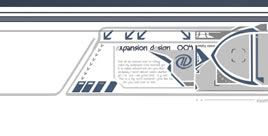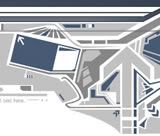| |
| Saturday, August 12, 2006 |
| Recent Changes at Google,Yahoo and MSN |
There are many changes taking place in the top search engines. Google, Yahoo, and MSN are all adapting to the many transformations occuring within the search industry. Because of these changes, I thought I would take the time to give you an overview of what's taking place within the market and how it affects you as a webmaster. To begin, let's start with Google.
Back in 2003, Google would index and crawl the web about once a month and everything would change all in one shot. WebMasterWorld would actually name these updates with names like Brandy, Florida, and Bourbon.
Google has moved away from these monthly updates to an ever-changing process. You can now see daily changes within the SERPS with the biggest changes occuring during algorithm updates.
Late June and July of this year saw some major changes within the Google algorithm. If your site was hurt from this algorithm change, you should re-examine your site and be sure to follow the guidelines below:
1. Pursue a continuous linking campaign with other quality sites. This can be achieved through article syndication, exchanging RSS feeds, submitting to directories or syndicating a press release.
2. Create a Google sitemap to increase the coverage of your webpages.
3. Make sure your site has a clear navigation system. Every page should be reachable from at least one static link.
4. Avoid all deceptive or manipulative behavior. Don't get involved in linking schemes. Avoid all forms of cloaking and avoid hidden text or hidden links.
Besides the changes taking place within organic search results, there have also been recent changes within Google Adwords. In July of 2006, Google updated their landing page algorithm. These changes have harmed a number of online marketers. Many advertisers who had been paying five or ten cents a clíck are now required to bid at least 50 cents to a dolloar or more. There are also other advertisers who kept their bid prices, but those bids are now buying only 3rd or 4th page positions when they used to buy first page positions.
Some advertisers have even been effectively shutdown.
However, keep in mind that not all advertisers have been affected. There are four main types of sites that have been hit the hardest. These include:
one page salës letter websites
squeeze pages
adsense sites (particularly those involved in Adsense arbitrage)
affíliate sites
The new landing page algorithm gives a quality score to every landing page. Fortunately for us, Google has left some clues as to how they are ranking these pages.
Below are 3 general guidelines that will help those who have been hurt by the recent updates.
1. Provide relevant and substantial content.
2. Link to the page on your site that provides the most useful and accurate information related to the product or service in your ad.
3. Distinguish sponsored links from the rest of your site's content.
To stay in accördance with the new quality score guidelines, you may want to remove all Adsense ads from your landing pages, create or find more original content for your sites, ensure that your landing page has at least 500 words, and chëck to make sure that your ad relates perfectly with the content of your landing page.
There are many changes taking place in the top search engines. Google, Yahoo, and MSN are all adapting to the many transformations occuring within the search industry. Because of these changes, I thought I would take the time to give you an overview of what's taking place within the market and how it affects you as a webmaster. To begin, let's start with Google.
Back in 2003, Google would index and crawl the web about once a month and everything would change all in one shot. WebMasterWorld would actually name these updates with names like Brandy, Florida, and Bourbon.
Google has moved away from these monthly updates to an ever-changing process. You can now see daily changes within the SERPS with the biggest changes occuring during algorithm updates.
Late June and July of this year saw some major changes within the Google algorithm. If your site was hurt from this algorithm change, you should re-examine your site and be sure to follow the guidelines below:
1. Pursue a continuous linking campaign with other quality sites. This can be achieved through article syndication, exchanging RSS feeds, submitting to directories or syndicating a press release.
2. Create a Google sitemap to increase the coverage of your webpages.
3. Make sure your site has a clear navigation system. Every page should be reachable from at least one static link.
4. Avoid all deceptive or manipulative behavior. Don't get involved in linking schemes. Avoid all forms of cloaking and avoid hidden text or hidden links.
Besides the changes taking place within organic search results, there have also been recent changes within Google Adwords. In July of 2006, Google updated their landing page algorithm. These changes have harmed a number of online marketers. Many advertisers who had been paying five or ten cents a clíck are now required to bid at least 50 cents to a dolloar or more. There are also other advertisers who kept their bid prices, but those bids are now buying only 3rd or 4th page positions when they used to buy first page positions.
Some advertisers have even been effectively shutdown.
However, keep in mind that not all advertisers have been affected. There are four main types of sites that have been hit the hardest. These include:
one page salës letter websites
squeeze pages
adsense sites (particularly those involved in Adsense arbitrage)
affíliate sites
The new landing page algorithm gives a quality score to every landing page. Fortunately for us, Google has left some clues as to how they are ranking these pages.
Below are 3 general guidelines that will help those who have been hurt by the recent updates.
1. Provide relevant and substantial content.
2. Link to the page on your site that provides the most useful and accurate information related to the product or service in your ad.
3. Distinguish sponsored links from the rest of your site's content.
To stay in accördance with the new quality score guidelines, you may want to remove all Adsense ads from your landing pages, create or find more original content for your sites, ensure that your landing page has at least 500 words, and chëck to make sure that your ad relates perfectly with the content of your landing page.
Google is getting smarter everyday. Our job is not to trick the search engines but to deliver truly valuable information to our visitors. By doing this along with some basic on-page and off-page optimization techniques, you should perform very well in the search engines over the long-haul.
There have also been some recent changes at MSN.
They have changed the name of their search engine spiders. Before the changes, they were all called "msnbot,". Fortunately, they are now starting to group their spiders into separate categories.
The MSN Shopping bot is msnbot-products.
The MSN News bot is msnbot-news.
The MSN Image Search bot is msnbot-media.
The MSN search bot is still called msnbot.
It should now be much easier for webmasters to decipher what's really going on in their web logs. In addition, webmasters can also block specific bots if they need to, without blocking MSN Search.
Last, but not least, there is Yahoo. This company has experienced some very exciting changes within the past few months.
One of these is the launch of a new Yahoo Search Crawler. The new crawler is faster and more efficient at visiting websites. As a result, website owners should notice as much as a 25% reduction in the number of requests and bandwidth consumed by the Yahoo crawler.
Yahoo also released an index update in mid-July. You can read all about it at http://www.ysearchblog.com.
In addition, there are a number of other, smaller-based search engines who are leading the way in the future of search engine technology. One of the best examples I have seen is Eurekster.com. They have developed a social search engine powered by the wisdom of crowds.
Eurekster makes use of its own SearchMemory technology, which remembers the sites a user finds useful and presents them higher in the results the next time they search. Then, Eurekster lets a user share their searches and sites with friends. For example, if you do a search on "internet marketing", you'll see sites related to "internet marketing" that your friends also found useful. These results are marked with an icon.
This personalization helps to increase relevancy in a way that no algorithm can match.
I expect to see many changes within Google, Yahoo, and MSN in upcoming years as they merge search engine technology with social search in order to make search results more relevant as well as personalized. One thing is clear, the future evolution of search is sure to be exciting to watch.
About The Author
Kim Roach is a staff writer and editor for the SiteProNews and SEO-News newsletters. You can contact Kim at: kim @ seo-news.com . |
|
|
|
|
posted by admin @ 2:31 PM  |
|
|
|

|
MARKETIVA

Marketiva is a financial services corporation specialized in providing traders with high quality online spot forex trading services.
More...
|
|
 Add Me! - Search Engine Optimization
Add Me! - Search Engine Optimization
|

|
|










